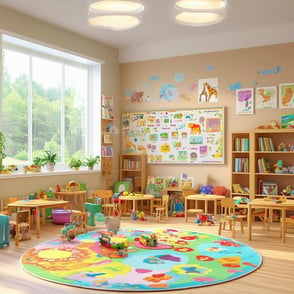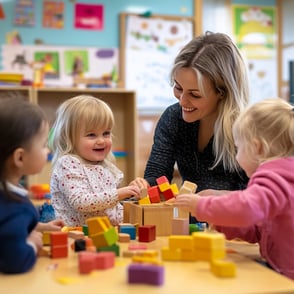Friedrich Froebel: The Architect of Early Childhood Education
When delving into the history of early childhood education, one cannot overlook the remarkable contributions of Friedrich Froebel—a pioneering German educator whose ideas have left an indelible mark on educational systems worldwide. Known best for founding the concept of kindergarten, Froebel's innovative approach to learning emphasises the importance of play and activity in child development. In this blog post, we will explore Froebel's history, training, and key research, examine how his teachings became mainstream in Western pedagogy throughout the 20th century, and discuss his impact on contemporary educational psychology and practice.
But before you go on, take a look at our blogs on other early years educators and thinkers from across the US and Europe...
A Glimpse into Froebel's Life and Training
Born on April 21, 1782, in the small village of Oberweissbach, Germany, Friedrich Froebel was the youngest of five sons. His early life was marked by a deep connection to nature, which later influenced his educational philosophy. After losing his mother at a young age and experiencing a strained relationship with his stepmother, Froebel found solace in the natural world around him.
Froebel's formal education was diverse and somewhat eclectic, reflecting his broad interests and intellectual curiosity. He initially studied architecture at the University of Jena, but his real passion for education emerged during his studies at the University of Göttingen and the University of Berlin, where he was influenced by the works of Johann Heinrich Pestalozzi and Johann Wolfgang von Goethe.
Froebel's educational philosophy was deeply rooted in his belief that early childhood is a critical period for development (see Nobel Laureate Professor Heckman's work on the ROI curve on investment in early education). He began his career as a teacher and soon realised the limitations of the traditional educational system, which often stifled creativity and curiosity in young children. This realisation led him to develop his own educational methods, which he implemented in a school he established in 1817. However, it was in 1837, when he founded his first kindergarten in Bad Blankenburg, that Froebel's revolutionary ideas truly began to take shape.
Key Research and Contributions
Froebel's most notable contribution to education is, without a doubt, the kindergarten—a term he coined, which means "children's garden" in German. This concept was groundbreaking in that it recognised the importance of early childhood education and the role of play in learning. Froebel believed that children learn best through self-activity, exploration, and play, which are facilitated in a nurturing environment.
One of Froebel's key research components was his creation of "Froebel's Gifts," a series of educational toys designed to stimulate learning through play. These gifts included objects such as balls, cubes, and cylinders, which encouraged children to explore shapes, forms, and spatial relationships. These activities helped children develop fine motor skills, creativity, and an understanding of mathematical concepts, laying the groundwork for later learning.
Froebel's emphasis on the interconnectedness of life, nature, and education is evident in his Froebelian principles. These principles assert that education should be holistic, focusing on the development of the whole child—cognitively, socially, emotionally, and physically. They also emphasise the importance of community, suggesting that education should be a collaborative process involving teachers, parents, and children themselves.
Froebel's Influence on Western Pedagogy
Froebel's ideas gradually gained traction in Europe and the United Kingdom, eventually making their way to the United States in the late 19th and early 20th centuries. His emphasis on play and creativity resonated with educators who were frustrated with the rigid, didactic approaches that dominated the era. As a result, his methods became integrated into mainstream pedagogy across the Western world.
In the United States, Froebel's influence can be seen in the work of educators such as Elizabeth Peabody and Susan Blow, who were instrumental in establishing kindergartens based on Froebelian principles. These early adopters recognised that Froebel's approach fostered not only academic skills but also social and emotional development, which was increasingly valued in a rapidly changing society.
The impact of Froebel's work extended into the 20th century, influencing educational theorists like John Dewey, who emphasised experiential learning and the importance of the child's environment in education. Froebel's focus on the active role of the learner and the significance of play is echoed in Dewey's progressive education movement.
See how we've incorporated some of the principles of Froebels practice into all of our beautiful settings across London
Froebel's Impact on Contemporary Educational Psychology and Theory
Froebel's influence on contemporary educational psychology and theory is profound. His recognition of the importance of early childhood experiences aligns closely with the theories of Jean Piaget and Lev Vygotsky, both of whom emphasised the significance of active learning and social interaction in cognitive development.
Piaget's theory of cognitive development, which categorises children's learning into distinct stages, supports Froebel's belief in the need for age-appropriate, hands-on learning experiences. Similarly, Vygotsky's sociocultural theory, which highlights the role of social interaction in learning, reinforces Froebel's emphasis on the collaborative nature of education and the importance of community in the learning process.
In the UK and Europe, Froebel's principles continue to influence early childhood education. The Reggio Emilia approach, which originated in Italy, shares Froebel's belief in the child's potential and the importance of a supportive learning environment. This approach, like Froebel's, values the role of the teacher as a facilitator who observes, supports, and extends children's learning experiences.
Comparing Froebel with Other Educators and Psychologists
To fully appreciate Froebel's contributions, it's valuable to compare his work with that of other noted educators, educational psychologists, and developmental psychologists in the UK, Europe, and the United States during the 20th century.
Maria Montessori, an Italian physician and educator, developed the Montessori method, which also emphasises hands-on, self-directed learning. While both Froebel and Montessori recognised the importance of play, Montessori focused more on individualised learning and the development of practical life skills. In contrast, Froebel's approach was more community-oriented, emphasising collective play and social interaction.
John Dewey, an American philosopher and educator, shared Froebel's belief in experiential learning and the active role of the learner. Dewey's progressive education movement, which advocated for learning through doing, parallels Froebel's emphasis on play as a vital component of education. Both educators believed in the importance of fostering a democratic, collaborative learning environment.
Jean Piaget and Lev Vygotsky focused more on the cognitive and social aspects of learning, respectively. Piaget's stages of development align with Froebel's understanding of the developmental needs of children at different ages. Vygotsky, on the other hand, emphasised the role of social context and language in learning, complementing Froebel's emphasis on community and collaboration.
Froebel's Principles in Modern Education
While Froebel's ideas were groundbreaking in his time, they continue to influence modern education. The Froebelian principles, which advocate for a holistic, child-centered approach to learning, are increasingly relevant in today's educational landscape. As we recognise the importance of social-emotional learning and the development of critical thinking skills, Froebel's belief in the power of play and creativity remains vital.
In contemporary classrooms, educators are finding innovative ways to incorporate Froebelian principles. Project-based learning, for instance, allows children to explore topics of interest through hands-on activities, much like Froebel's Gifts encouraged exploration and discovery. Similarly, the emphasis on outdoor education and connecting with nature reflects Froebel's understanding of the importance of the natural world in children's development.
Conclusion
Friedrich Froebel's legacy as the architect of early childhood education is undeniable. His innovative ideas about the importance of play, creativity, and community in learning have shaped educational practices and philosophies worldwide. As we continue to explore new ways to engage and educate young learners, Froebel's principles offer valuable insights into the power of a nurturing, holistic approach to education.
In a world that increasingly values creativity, collaboration, and critical thinking, Froebel's vision of education as a "children's garden" remains as relevant and inspiring as ever. By embracing the Froebelian principles and fostering environments where play and exploration are central to learning, we can empower future generations to thrive in an ever-changing world.

01-Jan-2025 17:30:04
Related Articles








Write a Comment